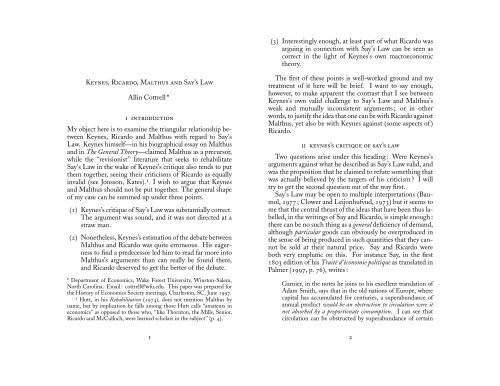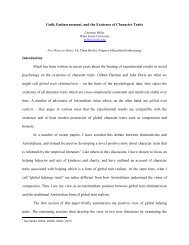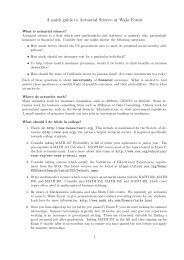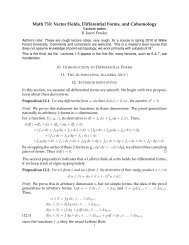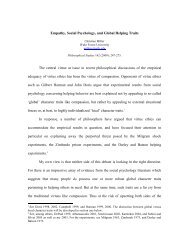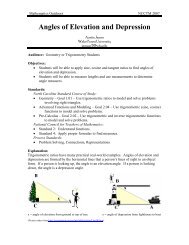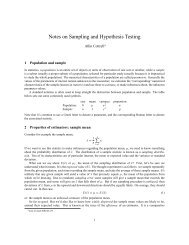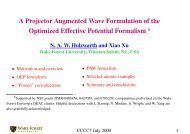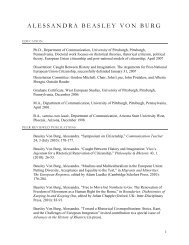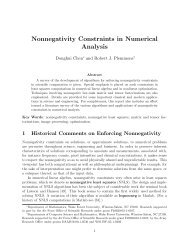Keynes, Ricardo, Malthus and Say's Law - Wake Forest University
Keynes, Ricardo, Malthus and Say's Law - Wake Forest University
Keynes, Ricardo, Malthus and Say's Law - Wake Forest University
Create successful ePaper yourself
Turn your PDF publications into a flip-book with our unique Google optimized e-Paper software.
(3) Interestingly enough, at least part of what <strong>Ricardo</strong> wasarguing in connection with Say’s <strong>Law</strong> can be seen ascorrect in the light of <strong>Keynes</strong>’s own macroeconomictheory.<strong>Keynes</strong>, <strong>Ricardo</strong>, <strong>Malthus</strong> <strong>and</strong> Say’s <strong>Law</strong>Allin Cottrell *i introductionMy object here is to examine the triangular relationship between<strong>Keynes</strong>, <strong>Ricardo</strong> <strong>and</strong> <strong>Malthus</strong> with regard to Say’s<strong>Law</strong>. <strong>Keynes</strong> himself—in his biographical essay on <strong>Malthus</strong><strong>and</strong> in The General Theory—claimed <strong>Malthus</strong> as a precursor,while the ‘‘revisionist’’ literature that seeks to rehabilitateSay’s <strong>Law</strong> in the wake of <strong>Keynes</strong>’s critique also tends to putthem together, seeing their criticisms of <strong>Ricardo</strong> as equallyinvalid (see Jonsson, Kates).¹ I wish to argue that <strong>Keynes</strong><strong>and</strong> <strong>Malthus</strong> should not be put together. The general shapeof my case can be summed up under three points.(1) <strong>Keynes</strong>’s critique of Say’s <strong>Law</strong> was substantially correct.The argument was sound, <strong>and</strong> it was not directed at astraw man.(2) Nonetheless, <strong>Keynes</strong>’s estimation of the debate between<strong>Malthus</strong> <strong>and</strong> <strong>Ricardo</strong> was quite erroneous. His eagernessto find a predecessor led him to read far more into<strong>Malthus</strong>’s arguments than can really be found there,<strong>and</strong> <strong>Ricardo</strong> deserved to get the better of the debate.* Department of Economics, <strong>Wake</strong> <strong>Forest</strong> <strong>University</strong>, Winston-Salem,North Carolina. Email : cottrell@wfu.edu. This paper was prepared forthe History of Economics Society meetings, Charleston, SC, June 1997.¹ Hutt, in his Rehabilitation (1974), does not mention <strong>Malthus</strong> byname, but by implication he falls among those Hutt calls ‘‘amateurs ineconomics’’ as opposed to those who, ‘‘like Thornton, the Mills, Senior,<strong>Ricardo</strong> <strong>and</strong> McCulloch, were learned scholars in the subject’’ (p. 4).The first of these points is well-worked ground <strong>and</strong> mytreatment of it here will be brief. I want to say enough,however, to make apparent the contrast that I see between<strong>Keynes</strong>’s own valid challenge to Say’s <strong>Law</strong> <strong>and</strong> <strong>Malthus</strong>’sweak <strong>and</strong> mutually inconsistent arguments ; or in otherwords, to justify the idea that one can be with <strong>Ricardo</strong> against<strong>Malthus</strong>, yet also be with <strong>Keynes</strong> against (some aspects of )<strong>Ricardo</strong>.ii keynes’s critique of say’s lawTwo questions arise under this heading : Were <strong>Keynes</strong>’sarguments against what he described as Say’s <strong>Law</strong> valid, <strong>and</strong>was the proposition that he claimed to refute something thatwas actually believed by the targets of his criticism ? I willtry to get the second question out of the way first.Say’s <strong>Law</strong> may be open to multiple interpretations (Baumol,1977; Clower <strong>and</strong> Leijonhufvud, 1973) but it seems tome that the central thrust of the ideas that have been thus labelled,in the writings of Say <strong>and</strong> <strong>Ricardo</strong>, is simple enough :there can be no such thing as a general deficiency of dem<strong>and</strong>,although particular goods can obviously be overproduced inthe sense of being produced in such quantities that they cannotbe sold at their natural price. Say <strong>and</strong> <strong>Ricardo</strong> wereboth very emphatic on this. For instance Say, in the first1803 edition of his Traité d’économie politique as translated inPalmer (1997, p. 76), writes :Garnier, in the notes he joins to his excellent translation ofAdam Smith, says that in the old nations of Europe, wherecapital has accumulated for centuries, a superabundance ofannual product would be an obstruction to circulation were itnot absorbed by a proportionate consumption. I can see thatcirculation can be obstructed by superabundance of certain1 2
products, but that can only be a passing evil, for people willsoon cease to engage in a line of production whose productsexceed the need for them <strong>and</strong> lose their value, <strong>and</strong> they willturn to the production of goods more in dem<strong>and</strong>. But I donot see how the products of a nation in general can ever betoo abundant, for each such product provides the means forpurchasing another.In the same vein <strong>Ricardo</strong> writes in the Principles (1951, p.290) :No man produces, but with a view to consume or sell, <strong>and</strong>he never sells, but with an intention to purchase some othercommodity, which may be immediately useful to him, orwhich may contribute to future production. By producing,then, he necessarily becomes either the consumer of his owngoods, or the purchaser <strong>and</strong> consumer of the goods of someother person. It is not to be supposed that he should, for anylength of time, be ill-informed of the commodities which hecan most advantageously produce, to attain the object whichhe has in view, namely, the possession of other goods ; <strong>and</strong>,therefore, it is not probable that he will continually producea commodity for which there is no dem<strong>and</strong>.Or, more pithily, ‘‘Too much of a particular commodity maybe produced, of which there may be such a glut on the market,as not to repay the capital expended on it ; but this cannot bethe case with respect to all commodities. . . ’’ (1951, p. 292).<strong>Keynes</strong>’s slogan—‘‘supply creates its own dem<strong>and</strong>’’—seems no more than a convenient paraphrase of <strong>Ricardo</strong>’s‘‘By producing, then, [a man] necessarily becomes either theconsumer of his own goods, or the purchaser <strong>and</strong> consumerof the goods of some other person.’’ An even closer matchis <strong>Ricardo</strong>’s assertion, in criticism of <strong>Malthus</strong>, that ‘‘dem<strong>and</strong>depends only on supply’’ (<strong>Ricardo</strong>, 1951a, p. 365). I thereforedon’t see the force of contrast in statements such as thatof Kates (1997, p. 192) : ‘‘Since the publication of the GeneralTheory the meaning of Say’s <strong>Law</strong> has radically shifted.The phrase which has become associated with Say’s <strong>Law</strong>are the words introduced by <strong>Keynes</strong>, ‘supply creates its owndem<strong>and</strong>’ ’’.²Although it is not central to my case here, I would alsolike to draw attention to my argument elsewhere (Cottrell,1994) that <strong>Keynes</strong> was correct in attributing Say’s <strong>Law</strong> inthis sense to his contemporary Pigou ; the latter’s Theory ofUnemployment (1930) depends on this assumption at certaincrucial points.And so to the validity of <strong>Keynes</strong>’s critique. <strong>Keynes</strong> hasthe volume of investment spending governed jointly by theschedule of the Marginal Efficiency of Capital <strong>and</strong> the rateof interest ; he also has the rate of interest governed jointlyby the quantity of money available <strong>and</strong> the degree of liquiditypreference, <strong>and</strong> the volume of consumption expendituregoverned by consumers’ incomes via a fractional marginalpropensity to consume. In this light consider the two ‘‘experiments’’that <strong>Keynes</strong> treats as the most likely triggers of adeficiency of effective dem<strong>and</strong> : a fall in the schedule of theMarginal Efficiency of Capital <strong>and</strong> an increase in the degreeof liquidity preference. (The worst case is when they areconjoined, but they may be considered independently.)(1) A fall in the MEC schedule. This may occur for variousreasons, such as the coming to an end of a period of rapidpopulation growth or technological progress, or a politicallydetermined shock such as the overvaluation of the nationalcurrency, as with Britain’s return to gold under Churchill.The question for upholders of Say’s <strong>Law</strong> is how a generalfall in dem<strong>and</strong> is to be averted. At a given rate of interest, thefall in the MEC schedule will generate a fall in investment,which will in turn, by reducing aggregate expenditure <strong>and</strong>income, generate a secondary fall in consumption (i.e. themultiplier). The only way to avert this result, it would seem,is for the rate of interest to fall immediately. Such a fall would² On the next page Kates goes on to say that the ‘‘meaning of Say’s<strong>Law</strong> was further distorted in a 1942 paper by Oskar Lange’’ (emphasisadded), underlining the idea that <strong>Keynes</strong>’s representation was already adistortion.3 4
offset the incipient decline in investment, <strong>and</strong> might also (ifthe balance of the income <strong>and</strong> substitution effects is right)stimulate the propensity to consume to some degree. If thesum of these positives is great enough to counterbalance theinitial negative effect on expenditure, then aggregate dem<strong>and</strong>is maintained.<strong>Keynes</strong>’s point, however, is that a fall in the rate of interestof this degree cannot be expected. For as the interest rategoes down, the relative attractiveness of liquid, monetaryassets vis-à-vis less liquid interest-bearing assets is increased.If the stock of money is presumed fixed, the interest rate—which does the job of balancing the desire to hold moneywith the available stock—is not free to fall.³There is a secondary escape route for the re-establishmentof the original level of aggregate dem<strong>and</strong> in real terms, aftera period of unemployment. That is, if money wages beginto fall in response to unemployment, <strong>and</strong> prices followwages down, this increases the real stock of money, permittinga fall in the rate of interest. But <strong>Keynes</strong> arguedthat this scenario—which has come ironically to be knownas the ‘‘<strong>Keynes</strong> effect’’—is only one among many possibleconsequences of general deflation, several of which are unfavourableto the expansion of aggregate dem<strong>and</strong> (e.g. theexpectation of further deflation, which raises the real rate ofinterest ex ante for any given nominal rate, the transfer of purchasingpower from debtors to creditors, <strong>and</strong> the bankruptcyof those who borrowed at the earlier, higher prices—seeChapter 19 of the General Theory <strong>and</strong> Tobin, 1980).(2) The case of an increase in liquidity preference.<strong>Keynes</strong>’s argument here is straightforward : an increase inthe desire to hold liquid money balances will force the rate ofinterest upward, hence depressing investment for any givenlocation of the MEC schedule (<strong>and</strong> also depressing consumption,if it is interest-sensitive in the direction that wouldbe helpful for the restoration of aggregate dem<strong>and</strong> in the pre-³ For an expansion of this point see Cottrell <strong>and</strong> <strong>Law</strong>lor (1991).vious case). Again, the multiplier will lead to an amplified fallin aggregate dem<strong>and</strong>. It is important to note that <strong>Keynes</strong>is not simply making the point that the hoarding of moneybrings a reduction in the aggregate dem<strong>and</strong> for goods. Thatpoint, it could be argued, was well understood by the ‘‘classics’’,albeit as a theoretical limiting case of little practicalsignificance. An increase in liquidity preference, in <strong>Keynes</strong>’sview, need not express itself in an actual transfer of moneyinto idle hoards, or not on any large scale. Rather, the rateof interest is driven up to the point where the ‘‘propensityto hoard’’ (<strong>Keynes</strong>, 1936, p. 174) is balanced with the stockof money available for this purpose. The damage to aggregatedem<strong>and</strong> is not done directly—the diversion of a streamof expenditure of money on goods, into a stream of moneyinto coffers—but indirectly, via the depressing effect of highinterest on investment.Consider this illustration. Let the initial ratio of annualincome, Y , to the stock of money, M, be denoted by V . Letan initial fraction a of the money stock be employed in activecirculation <strong>and</strong> the remainder, 1 − a, be held as ‘‘idle’’ balances.Now suppose that an increase in liquidity preferencecauses Y to fall by 4 percent. As a first approximation therequirement for active balances will also fall by 4 percent,leaving an amount .04aM to be absorbed into idle balances.Since M = Y/V we can write this increment to idle balancesas .04aY/V ; as a fraction of initial Y this amounts to.04a/V . Illustrating with a = 0.9 <strong>and</strong> V = 5, the increasein idle balances is then only 0.72 percent of the initial Y .I don’t suppose I have said enough to convince anyonewith a strong inclination to believe that <strong>Keynes</strong>’s critique ofSay’s <strong>Law</strong> was misguided, but I hope I have said enoughto bring out the point that this critique hinges on questionsof interest <strong>and</strong> money. That is, it turns on the rejectionof the idea—taken for granted by both Say <strong>and</strong> <strong>Ricardo</strong>—that money is held only in a fleeting transitional momentbetween the sale <strong>and</strong> purchase of goods, <strong>and</strong> consequentlythat economic analysis can legitimately proceed as if it were5 6
dealing with a barter economy.It is this dimension that is almost entirely missing from<strong>Malthus</strong>’s criticism of Say <strong>and</strong> <strong>Ricardo</strong> ; its absence meansthat his critique necessarily misses the mark, <strong>and</strong> that<strong>Keynes</strong>’s admiration for him is misplaced. The next sectionjustifies the claim that <strong>Malthus</strong> missed the mark ; hereI will put on the table <strong>Keynes</strong>’s assessment of him. <strong>Keynes</strong>’sremarks are to be found (mostly) in his biographical essay(in <strong>Keynes</strong>, 1963) <strong>and</strong> in chapters 3 <strong>and</strong> 23 of The GeneralTheory. Of course <strong>Keynes</strong> is aware of shortcomings in<strong>Malthus</strong> ; he notes variously that the latter ‘‘was unable toexplain clearly (apart from an appeal to the facts of commonobservation) how <strong>and</strong> why effective dem<strong>and</strong> could be deficientor excessive’’, that he ‘‘failed to furnish an alternativeconstruction’’ (1936, p. 32), <strong>and</strong> even that ‘‘<strong>Malthus</strong>’s defectlay in his overlooking entirely the part played by the rateof interest’’ (1963, p. 123). Nonetheless <strong>Keynes</strong> offered thejudgment that in <strong>Malthus</strong> ‘‘the notion of the insufficiency ofeffective dem<strong>and</strong> takes a definite place as a scientific explanationof unemployment’’ (1936, p. 362), <strong>and</strong> that <strong>Ricardo</strong>was ‘‘stone-deaf to what <strong>Malthus</strong> was saying’’ (363). Commentingon the <strong>Ricardo</strong>–<strong>Malthus</strong> correspondence he says‘‘<strong>Malthus</strong> is dealing with the monetary economy in whichwe happen to live ; <strong>Ricardo</strong> with the abstraction of a neutralmoney economy’’ (<strong>Keynes</strong>, 1963, p. 116). ‘‘Time after timein these letters,’’ <strong>Keynes</strong> continues, ‘‘ <strong>Malthus</strong> is talking plainsense, the force of which <strong>Ricardo</strong> with his head in the cloudswholly fails to comprehend’’ (1963, pp. 117–8). He furthertalks of ‘‘crushing refutations’’ by <strong>Malthus</strong>, <strong>and</strong> of <strong>Malthus</strong>’s‘‘complete comprehension of the effects of excessive savingon output via its effects on profit’’ (ibid.). He speaks withstrong approval of the chapter of <strong>Malthus</strong>’s Principles dealingwith the role of unproductive consumers, <strong>and</strong> sighs ‘‘Ifonly <strong>Malthus</strong> rather than <strong>Ricardo</strong> had been the parent stemfrom which nineteenth-century economics proceeded, whata much wiser <strong>and</strong> richer place the world would be to-day !’’(1963, p. 120). I will argue that this is greatly overblown.iii ricardo versus malthusThe debate between these two writers was very extensive,including a voluminous personal correspondence over manyyears. For the modern reader, however, with the Sraffa–Dobb volumes to h<strong>and</strong>, the locus classicus is probably the paralleltext of <strong>Malthus</strong>’s Principles—in large measure a critiqueof Say <strong>and</strong> <strong>Ricardo</strong>—<strong>and</strong> <strong>Ricardo</strong>’s commentary or rebuttal(<strong>Ricardo</strong>, 1951a). Although their disagreement over Say’s<strong>Law</strong> surfaces in numerous places, the most sustained discussionsare found in <strong>Malthus</strong>’s chapter vii, ‘‘On the ImmediateCauses of the Progress of Wealth,’’ <strong>and</strong> in particular sectionsiii <strong>and</strong> ix of that chapter (on accumulation <strong>and</strong> unproductiveconsumption respectively).⁴Let us take the section on accumulation ‘‘as a Stimulusto the Increase of Wealth’’ first. <strong>Malthus</strong> begins by sayingthat ‘‘no permanent <strong>and</strong> continued increase of wealthcan take place without a continued increase of capital’’ <strong>and</strong>that an ongoing increase of capital clearly requires saving, orthe ‘‘conversion of revenue into capital’’. (In classical terminologythe income of the capitalists becomes ‘‘revenue’’if it spent on servants, luxuries or other articles of capitalistconsumption, while it becomes ‘‘capital’’ if it is spent onthe maintenance of productive labour, labour that producescommodities to be sold at profit.) But he quickly adds thataccumulation, while basically beneficial, can be overdone :excessive parsimony will mean that the extra commoditiesproduced will fail to find a market (at a price that coverscost, at any rate).It is undoubtedly possible by parsimony to devote at once⁴ <strong>Keynes</strong> also refers to <strong>Malthus</strong>’s chapter v section iv, ‘‘Remarks onMr <strong>Ricardo</strong>’s Theory of Profits,’’ but I don’t find this to be very much tothe point. In this section <strong>Malthus</strong> makes the argument that a change inwages will not necessarily leave total income unchanged (by causing anexactly offsetting change in profits). <strong>Ricardo</strong> actually agrees with that,but argues that the effects whereby a change in wages fails to generate anoffsetting change in profits are second-order. Also, <strong>Malthus</strong> does not tiethis point directly to his attack on Say’s <strong>Law</strong>.7 8
a much larger share than usual of the produce of a countryto the maintenance of productive labour ; <strong>and</strong> it is quitetrue that the labourers so employed are consumers as wellas unproductive labourers ; <strong>and</strong> as far as the labourers areconcerned, there would be no diminution of consumptionor dem<strong>and</strong>. But . . . the consumption <strong>and</strong> dem<strong>and</strong> occasionedby the persons employed in productive labour can never alonefurnish a motive to the accumulation <strong>and</strong> employment of capital(in <strong>Ricardo</strong>, 1951a, pp. 301–2, emphasis added).Aggregate consumption on the part of the labourers mayremain constant as employment switches from unproductiveto productive labour, says <strong>Malthus</strong>, but capitalist consumptionfalls ex hypothesi, which leads him to ask ‘‘how it is possibleto suppose that the increased quantity of commodities,obtained by the increased number of productive labourers,should find purchasers. . . ’’ (p. 303).Note that this point, if it were correct, ‘‘proves too much’’.<strong>Malthus</strong> seems to suppose that aggregate dem<strong>and</strong> is composedof just two elements, labourers’ consumption <strong>and</strong> capitalists’consumption, <strong>and</strong> that accumulation in the first instanceleaves the former unchanged while reducing the latter.But this means that any move toward increased accumulationis inevitably going to generate a glut of commodities, whichsurely can’t be right <strong>and</strong> is certainly not an argument that<strong>Keynes</strong> makes. In terms of <strong>Keynes</strong>’s conception of aggregatedem<strong>and</strong>, of course, <strong>Malthus</strong> is leaving investment outof account.<strong>Malthus</strong> clearly recognizes that the point he has just madeis in conflict with Say <strong>and</strong> <strong>Ricardo</strong>, according to whom, in<strong>Malthus</strong>’s paraphrase, ‘‘there cannot be a glut of commoditiesin general ; because . . . commodities being always exchangedfor other commodities, one half will furnish a market for theother half.’’ This doctrine is ‘‘unfounded’’, claims <strong>Malthus</strong> :‘‘It is by no means true . . . that commodities are alwaysexchanged for commodities’’ (p. 307). The modern readerlooks for a mention of money at this point, but that is notwhat <strong>Malthus</strong> has in mind :The great mass of commodities is exchanged directly forlabour, either productive or unproductive ; <strong>and</strong> it is quiteobvious that this mass of commodities, compared with thelabour with which it is to be exchanged, may fall in valuefrom a glut just as any one commodity falls in value from anexcess of supply. . . . (pp. 307–8)<strong>Ricardo</strong> objects that in making this statement, <strong>Malthus</strong>has effectively switched the problem. The original problemwas that accumulation was likely to give rise to a unsaleablesurplus of commodities. But now it appears that the problemis really a labour shortage : the ‘‘mass of commodities’’available for the payment of labour increases relative to theavailable supply of labour, so that the real wage increases <strong>and</strong>profit is squeezed. Now <strong>Ricardo</strong> has no problem with this asa theoretical possibility ; <strong>and</strong> it is quite consistent with Say’s<strong>Law</strong>.For reference it may be useful to spell out <strong>Ricardo</strong>’s ideason how accumulation is self-limiting. There are two mechanismshere, operating on different time scales. At the level ofthe secular long run (as is well known), <strong>Ricardo</strong> envisaged diminishingreturns in agriculture—due to the extension of themargin in face of the need to feed a larger population—<strong>and</strong>thought that this would put profits under a double squeezefrom wages <strong>and</strong> rents. In the shorter run, however, if thesize of the workforce were relatively fixed, then an increasingdem<strong>and</strong> for labour would tend to drive up the wage independentlyof the agricultural mechanism, <strong>and</strong> again force profitdown. Such a fall in profit would blunt the stimulus of gain<strong>and</strong> cause a slowdown of accumulation.⁵ <strong>Malthus</strong>’s point, itwould seem, is none other than the latter.It is quite true that commodities may exist in such abundance,compared with labour, as to make their values so to fall,estimated in labour, as not to afford any inducement to theirfurther production. . . . If Mr. <strong>Malthus</strong> means that there maybe such a glut of commodities as to make them ruinously⁵ Cf. Marx in Capital, i, ch. 25.9 10
cheap in labour I agree with him, but this is only saying thatlabour is so high that it absorbs all that fund which oughtto belong to profits, <strong>and</strong> therefore the capitalist will have nointerest in continuing to accumulate. (<strong>Ricardo</strong>, 1951a, p.308)As <strong>Ricardo</strong> further notes, the situation of the labourer willbe far from miserable under these circumstances.<strong>Malthus</strong> goes on to press a second charge against Say <strong>and</strong><strong>Ricardo</strong>, namely that they fail to take ‘‘into consideration theinfluence of so general <strong>and</strong> important a principle in humannature, as indolence or the love of ease’’ (p. 313). Specifically,he claims that the proposition that there can be nogeneral shortage of dem<strong>and</strong>, in the face of an increase inproductive potential, rests on the assumption that ‘‘luxuriesare always preferred to indolence. The effect of a preferenceof indolence to luxuries would evidently be to occasion awant of dem<strong>and</strong> for the returns of the increased powers ofproduction, <strong>and</strong> to throw labourers out of employment’’ (p.313). <strong>Ricardo</strong> is able to make short work of this objection.<strong>Malthus</strong> has switched the problem again. <strong>Ricardo</strong> is happyto admit that there may come a point where leisure is preferredto further material consumption, but in that case theextra commodities will simply not be produced.We do not say the commodities will under all circumstancesbe produced, but if they are produced we contend there willalways be some who have the will <strong>and</strong> power to consumethem. . . . Men will prefer indolence to luxuries ! luxuriesthen will not be produced, because they cannot be producedwithout labour, the opposite of indolence. If not producedthey cannot want a market, there can be no glut of them.(<strong>Ricardo</strong>, 1951a, pp. 314–5)One further point in this section merits attention. If thecapitalists take a turn towards parsimony then it may wellbe that the market for luxuries contracts. <strong>Ricardo</strong>’s point isthen that some other market should exp<strong>and</strong> accordingly—specifically, more ‘‘necessaries’’ should be produced to supportan exp<strong>and</strong>ing workforce. <strong>Malthus</strong> considers this point,but objects that it would beno sort of use to the farmer to go cultivating his l<strong>and</strong> with aview merely to give food <strong>and</strong> clothing to his labourers. Hewould be doing nothing either for himself or his family, if heneither consumed the surplus of what they produced himself,nor could realize it in a shape that might be transmitted tohis descendants. (<strong>Ricardo</strong>, 1951a, pp. 318–9)This seems to be a central confusion in <strong>Malthus</strong>’s thinking,<strong>and</strong> <strong>Ricardo</strong> deftly exposes it (pp. 319–21). Providedthe supply of labour is elastic, the capitalist farmer will dovery well by reinvesting his surplus in the maintenance of aprogressively larger workforce.I am a farmer possessed of a thous<strong>and</strong> quarters of corn, <strong>and</strong>my object is to accumulate a fortune for my family. Withthis corn I can employ a certain number of men on the l<strong>and</strong>,which I rent, <strong>and</strong> after paying my rent the first year, realize1300 qrs., or 300 qrs. profit. The next year if there be plentyof labour in the market, I can employ a greater quantity thanbefore, <strong>and</strong> my 1300 quarters will become 1700, <strong>and</strong> so fromyear to year I go on increasing the quantity till I have madeit ten thous<strong>and</strong> quarters, <strong>and</strong> if labour be at the same pricecan comm<strong>and</strong> ten times the quantity of it that I could whenI commenced my operations. Have I not then accumulateda fortune for my family ? have I not given them the powerof employing labour in any way they please, <strong>and</strong> of enjoyingthe fruits of it ?The only obstacles here are those that <strong>Ricardo</strong> has alreadyrecognized, namely ‘‘an increase in the price of labour, ora diminution in the productive powers of the l<strong>and</strong>.’’ Indeed,from a <strong>Keynes</strong>ian perspective it is hard to see whatcould go wrong, in terms of effective dem<strong>and</strong>, in this sortof barter of the products of the l<strong>and</strong> for labour services. Aswe said above, only the introduction of money, conceivedas something other than a mere means of circulation, can11 12
create a problem here—<strong>and</strong> there is no money in <strong>Malthus</strong>’sargument.⁶Some additional insight into the debate between <strong>Malthus</strong><strong>and</strong> <strong>Ricardo</strong> can be gained by considering <strong>Malthus</strong>’s case forthe necessity of ‘‘unproductive consumers’’ as a ballast forthe thrift of the capitalists (ch. vii, sec. ix of his Principles).<strong>Ricardo</strong> is incredulous ; from his point of view unproductiveconsumers are ‘‘just as necessary <strong>and</strong> as useful with a viewto future production, as a fire, which should consume in themanufacturers warehouse the goods which those unproductivelabourers would otherwise consume’’ (<strong>Ricardo</strong>, 1951a,p. 421). Insofar as <strong>Malthus</strong>’s proposal involves an increasein government expenditure—the paradigmatic ‘‘unproductivelabourer’’ is apparently a state functionary—it may betempting to assimilate it to modern <strong>Keynes</strong>ian ideas concerningfiscal policy. But this would be a mistake. Weshould note that <strong>Malthus</strong> recommends an increase in taxationto finance the payments to the unproductive consumers(<strong>Ricardo</strong>, 1951a, p. 433).The main point of interest in this section is the impliedcontrast between (a) the capitalist’s laying out his surplusin the form of payment of wages to additional labourers—acourse which, as we have seen, <strong>Malthus</strong> claimed was ‘‘no sortof use’’ in the pursuit of augmented wealth for the capitalistor his posterity—<strong>and</strong> (b) the appropriation of this surplusin the form of taxation, with the proceeds being passed, toput in bluntly, to a class of respectable parasites. Point (a)comes up again in this section when <strong>Malthus</strong> says ‘‘nobodywill ever employ capital merely for the sake of the dem<strong>and</strong>occasioned by those who work for him’’ (<strong>Ricardo</strong>, 1951a, p.429). But somehow it is all right if the dem<strong>and</strong> comes from⁶ That is, I agree with Sowell (1972, p. 96) when he says that, pace<strong>Keynes</strong>, <strong>Malthus</strong>’s analysis was in essence ‘‘as nonmonetary as that of thesupporters of Say’s <strong>Law</strong>.’’ The nearest <strong>Malthus</strong> comes to bringing moneyinto the Principles is an extended footnote (<strong>Ricardo</strong>, 1951a, pp. 316–7)urging its importance ; but this insight is not integrated into his analysisin any way.those who produce nothing. The only rationale for preferringconsumption on the part of unproductive labourers, it wouldseem, is precisely that the latter are unproductive—i.e. theydo not contribute to the production of a problematic surplusof commodities. This bespeaks a curious sort of ‘‘physicaloverproduction’’ theory on <strong>Malthus</strong>’s part, which is not tobe found in <strong>Keynes</strong>.⁷<strong>Ricardo</strong>’s question seems well put : ‘‘In what way cana man’s consuming my produce, without making me anyreturn whatever, enable me to make a fortune ? I shouldthink my fortune would be more likely to be made, if theconsumer of my produce returned me an equivalent value’’(<strong>Ricardo</strong>, 1951a, p. 422).⁸Also in this section <strong>Ricardo</strong> diagnoses what he sees asa key inconsistency in <strong>Malthus</strong>’s reasoning. <strong>Malthus</strong> saysthat, absent the unproductive consumers, too rapid an accumulationmay lead to a situation where ‘‘both capital <strong>and</strong>population may be at the same time, <strong>and</strong> for a period of greatlength, redundant, compared with the effective dem<strong>and</strong> forproduce’’ (<strong>Ricardo</strong>, 1951a, p. 427). <strong>Ricardo</strong> replies : ‘‘It isa contradiction in terms, it is saying that there is a capitalunemployed because its owner cannot find labourers, <strong>and</strong>there are people unemployed because there is no one havinga capital to employ them’’ (ibid.). So long as money is held⁷ Somewhat notoriously perhaps, <strong>Keynes</strong> held that even totally unproductiveactivities (e.g. burying pound notes <strong>and</strong> then digging them upagain) would be useful for stimulating a depressed economy, if they werefinanced by deficit spending. He did not, however, make any virtue of theunproductive nature of this activity, remarking that it ‘‘would, indeed, bemore sensible to build houses <strong>and</strong> the like’’ (<strong>Keynes</strong>, 1936, p. 129).⁸ As Kalecki (1954) showed, the aggregate (money) profits flowingto the capitalists are composed of capitalist expenditure (consumption<strong>and</strong> investment) plus the government’s budget deficit, plus the exportsurplus in an open economy, minus any saving made by the workers outof their wages. From this (admittedly anachronistic) perspective there isno stimulus to profit from a tax-financed increase in government transferpayments ; the effect on profit is negative if the taxation displaces capitalistexpenditure. I mention this point only to reinforce <strong>Ricardo</strong>’s skepticismfrom a different point of view.13 14
out of the picture—<strong>and</strong>, once again, <strong>Malthus</strong> does not bringit in—<strong>Ricardo</strong>’s argument seems unanswerable. If producecomm<strong>and</strong>s labour <strong>and</strong> labour buys produce, where can theblockage arise ?iv ricardo on smithIn the previous section I argued that <strong>Malthus</strong>’s criticismof <strong>Ricardo</strong> <strong>and</strong> Say misfires. Here I wish briefly to makethe point that the invocation of Say’s <strong>Law</strong> in <strong>Ricardo</strong>’s ownPrinciples of Political Economy <strong>and</strong> Taxation—in ch. xxi, ‘‘Effectsof Accumulation on Profits <strong>and</strong> Interest’’—turns out toplay a particular <strong>and</strong> unexpected role. <strong>Ricardo</strong> invokes Sayin the course of an argument that one might almost call <strong>Keynes</strong>ian: that investment ‘‘justifies itself ’’ (in the aggregate)by creating a dem<strong>and</strong> for its product. Although I don’t wishto push the point too far, this is somewhat akin to <strong>Keynes</strong>’smultiplier.The argument in question begins from a critique of AdamSmith, who, as <strong>Ricardo</strong> says, ‘‘uniformly ascribes the fall ofprofits to accumulation of capital, <strong>and</strong> to the competitionwhich will result from it.’’ Quoting from Smith, <strong>Ricardo</strong>continues thus :‘‘The increase of stock,’’ he says, ‘‘which raises wages, tendsto lower profit. When the stocks of many rich merchantsare turned into the same trade, their mutual competitionnaturally tends to lower its profit ; <strong>and</strong> when there is a likeincrease of stock in all the different trades carried on in thesame society, the same competition must produce the sameeffect in all.’’ Adam Smith speaks here of a rise in wages,but it is of a temporary rise, proceeding from increased fundsbefore the population is increased ; <strong>and</strong> he does not appear tosee, that at the same time that capital is increased, the work tobe effected by capital, is increased in the same proportion. M.Say has, however, most satisfactorily shewn, that there is noamount of capital which may not be employed in a country,because dem<strong>and</strong> is only limited by production. (<strong>Ricardo</strong>,1951, pp. 289–90)Against Smith’s idea that the ‘‘mutual competition’’ of capitalsof itself lowers the aggregate profit, <strong>Ricardo</strong> asserts thatthere is no limit to dem<strong>and</strong>—no limit to the employment ofcapital while it yields any profit, <strong>and</strong> that however abundantcapital may become, there is no other adequate reason fora fall of profit but a rise of wages, <strong>and</strong> further it may beadded, that the only adequate <strong>and</strong> permanent cause for therise of wages is the increasing difficulty of providing food <strong>and</strong>necessaries for the increasing number of workmen. (op. cit.,p. 296)What exactly is <strong>Ricardo</strong> arguing here ? I take it he isobjecting to the unwarranted projection of a microeconomicconception onto the macro level—which itself sounds rather<strong>Keynes</strong>ian. He would agree, of course, that any particularcommodity may be produced to the point where it becomesunprofitable : the market becomes saturated <strong>and</strong> the pricefalls. But, pace Smith, it is a mistake to suppose that thesame mechanism operates at the macro level.⁹ Why ? Although<strong>Ricardo</strong> does not spell it out in this way, I think wemay say the following. When we consider the effects of theexpansion of production of some commodity X we are doingpartial equilibrium analysis : we are supposing that thedem<strong>and</strong> schedule for the commodity in question is given,<strong>and</strong> that increased production moves us out along the givendem<strong>and</strong> curve. In that case increased production meansreduced profitability. But when we consider the effects ofaccumulation in general such a ceteris paribus assumption isuntenable. An economy-wide increase in investment inevitablypushes dem<strong>and</strong> schedules outward. This point isconsonant with <strong>Keynes</strong>’s analysis (the multiplier means thatan increase in investment gives rise to an increase in aggregatedem<strong>and</strong> greater than the initial increment to investment).⁹ This is expressed particularly clearly in <strong>Ricardo</strong> (1951a, p. 132),when he says that ‘‘no mistake can be greater’’ than the supposition ‘‘thata fall in profits is a necessary consequence of an accumulation of capital.’’15 16
<strong>Ricardo</strong> says that accumulation is limited only by profitability.With this <strong>Keynes</strong> could agree : in his theory investmentis not limited by dem<strong>and</strong> ; rather investment itselfconstitutes the proximate limit on dem<strong>and</strong>, via the multiplier.Where the two part company, however, is over <strong>Ricardo</strong>’s furtherclaim that the only serious restriction on the profitabilityof investment lies in diminishing returns in agriculture. For<strong>Keynes</strong> the profitability of real investment is the combinedeffect of the level of the schedule of the marginal efficiencyof capital <strong>and</strong> the money rate of interest, where the latterhas a ‘‘life of its own’’ <strong>and</strong> is not merely a reflection of a pregivenlevel of real profitability. <strong>Keynes</strong>ian unemploymentarises when the configuration of the MEC schedule <strong>and</strong> therate of interest is such that the resulting level of investmentfalls short of the saving that would be generated out of thefull-employment level of income. It’s not that investment islimited by dem<strong>and</strong>, as in Smith <strong>and</strong> <strong>Malthus</strong> : production islimited by dem<strong>and</strong>, but this is because the rate of interest istoo high to generate a volume of investment that correspondsto full-employment saving.v conclusionThe <strong>Malthus</strong>–<strong>Ricardo</strong> debate was essentially conductedon the terrain of a barter economy ; <strong>and</strong> on this terrain therecan be little doubt that <strong>Ricardo</strong> was right. <strong>Keynes</strong> said hewished that <strong>Malthus</strong> had won the debate with <strong>Ricardo</strong>. Butas the debate actually played out, had <strong>Malthus</strong> been perceivedas the victor this would simply have reflected badly on thelogical acumen of the audience. <strong>Keynes</strong>’s critique of Say’s<strong>Law</strong> depends essentially—as the title of his book remindsus—on issues of interest <strong>and</strong> money ; these were not in playin <strong>Malthus</strong>, <strong>and</strong> it is only with <strong>Keynes</strong>ian hindsight, <strong>and</strong> witha large benefit of the doubt, that <strong>Malthus</strong> can be credited withreal insight. ‘‘Surely it was a great fault in <strong>Ricardo</strong> to fail tosee any significance in [<strong>Malthus</strong>’s] line of thought,’’ wrote<strong>Keynes</strong> (1963, p. 123). But what <strong>Keynes</strong> is really saying,it seems to me, is that he wishes <strong>Ricardo</strong> had been able todiscern in <strong>Malthus</strong>’s erroneous <strong>and</strong> incoherent objections toSay’s <strong>Law</strong> the outline of the quite different critique that wasto be advanced by <strong>Keynes</strong> himself over a century later. Thatis asking too much !referencesBaumol, W. 1977. ‘‘Say’s (at Least) Eight <strong>Law</strong>s, or WhatSay <strong>and</strong> James Mill May Really Have Meant’’. Economica,May, pp. 145–61.Clower, R. W. <strong>and</strong> A. Leijonhufvud 1973. ‘‘Say’s Principle,What It Means <strong>and</strong> Doesn’t Mean’’. Intermountain EconomicReview, Fall. Reprinted in A. Leijonhufvud, Information<strong>and</strong> Coordination. New York : Oxford <strong>University</strong>Press, 1981.Cottrell, A. 1994. ‘‘<strong>Keynes</strong>’s Appendix to Chapter 19 : AReader’s Guide’’. History of Political Economy 26 :4, pp.681–95.<strong>and</strong> M. S. <strong>Law</strong>lor 1991. ‘‘ ‘Natural Rate’ Mutations: <strong>Keynes</strong>, Leijonhufvud <strong>and</strong> the Wicksell Connection’’.History of Political Economy 23:4, pp. 625–43.Hutt, W. H. 1974. A Rehabilitation of Say’s <strong>Law</strong>. Athens,OH : Ohio <strong>University</strong> Press.Jonsson, P. O. 1997. ‘‘On Gluts, Effective Dem<strong>and</strong> <strong>and</strong> theTrue Meaning of Say’s <strong>Law</strong>’’. Eastern Economic Journal(forthcoming).Kalecki, M. 1954. ‘‘The Determinants of Profits’’. In hisTheory of Economic Dynamics. London : George Allen<strong>and</strong> Unwin.Kates, S. 1997. ‘‘On the True Meaning of Say’s <strong>Law</strong>’’. EasternEconomic Journal (forthcoming).<strong>Keynes</strong>, J. M. 1936. The General Theory of Employment, Interest<strong>and</strong> Money. London : Macmillan.. 1963. Essays in Biography. New York : Norton.Marx, K. 1976. Capital, volume i, Harmondsworth : Penguin.17 18
Palmer, R. R. 1997. J.-B. Say. Princeton, NJ : Princeton<strong>University</strong> Press.Pigou, A. C. 1930. The Theory of Unemployment. London :Macmillan.<strong>Ricardo</strong>, D. 1951. Principles of Political Economy <strong>and</strong> Taxation.The Works <strong>and</strong> Correspondence of David <strong>Ricardo</strong>, Volumei. Edited by P. Sraffa with the collaboration of M.H. Dobb. Cambridge : Cambridge <strong>University</strong> Press.. 1951a. Notes on <strong>Malthus</strong>’s Principles of PoliticalEconomy. The Works <strong>and</strong> Correspondence of David <strong>Ricardo</strong>,Volume ii. Edited by P. Sraffa with the collaboration ofM. H. Dobb. Cambridge : Cambridge <strong>University</strong> Press.Sowell, T. 1972. Say’s <strong>Law</strong>, An Historical Analysis. Princeton,NJ : Princeton <strong>University</strong> Press.Tobin, J. 1980. Asset Accumulation <strong>and</strong> Economic Activity.Oxford : Basil Blackwell.19 20


